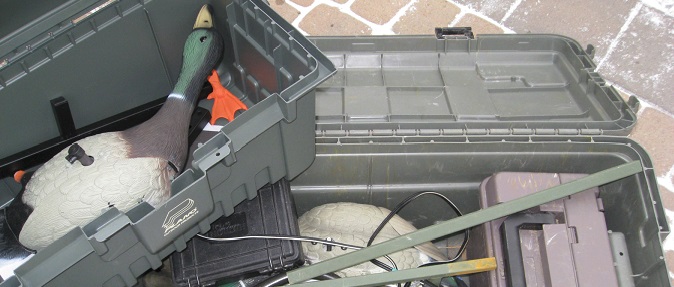
Make a plan and invest in a few affordable storage products for more efficient waterfowling
By Joe Balog
Duck hunters are obsessed with their gear. It’s no surprise. Few other forms of hunting include so many integral parts. Decoys, blinds, spare clothes and motion-makers must all be accounted for. There’s gear for the dog, safety equipment for the boat, multiple guns and tons of ammo, plus personal gear bags stuffed to the max. With so many things to keep track of, staying organized in the field is paramount to waterfowling success.
Duck hunting is all about working through the lulls and taking advantage of periods when birds are active. Hunters must work quickly and efficiently. Organization that starts in the shop must carry over into the field. It makes no sense to spend an entire off-season getting organized at home, only to break one’s discipline in the boat. Inevitably, such lapses cost birds.
As an admitted neat freak who’s been known to pursue ducks for sixty days straight, I can lay claim to a few tricks that will help you stay organized and effective during the upcoming duck season.
Safety first
Regardless of the size, type or style of watercraft used for hunting, responsible operational practices and proper loading are the primary keys to safety. I’ve seen duck boats capsize in icy waters on more than one occasion. Why? Each was loaded well beyond its capacity. Find the U.S. Coast Guard Maximum Capacities plate or sticker on your boat and live by it. Know how much your gear, dogs and hunting buddies weigh, then make sure your total weight doesn’t exceed the maximum capacity of your rig.
Stern-to-bow efficiency
Heavy items should be placed near the stern of the boat, as should more delicate items. The bow may pound while running in rough seas, and also takes the most spray. Areas near the stern enjoy a more stable ride. For this reason, my cohorts and I always place our unloaded guns, held comfortably in Plano floating shotgun cases, in the rear of my 14-foot aluminum boat. The back of the boat also holds an oversized marine battery capable of cranking a big mud motor, as well as powering a Humminbird GPS, spotlight and chargers for cell phones.
Moving forward, the entire floor area between the helm and passenger seats is reserved for decoys, where I routinely carry up to four dozen. I gave up on line winding long ago, and replaced all the lines and anchors on my Avian-X blocks with Rig ‘Em Right’s Texas-Rig anchor systems. This is an inherently neat system that minimizes tangles, while allowing decoys to be sorted in groups and attached to a carabiner clip for easy storage, deployment and retrieval. It’s also a very handy system when quick, short moves on foot are required.
A Plano Sportsman’s Trunk sits perfectly in front of my boat’s forward bench seat, and is an integral part of my organization system. This cavernous plastic trunk features a reinforced lid – an often overlooked, but vital feature for duck hunters. These boxes can be stepped on without fear of breakage, and can also be used as auxiliary seating. I use them to house spinning wing decoys and their components, as well as dry clothes, spare gloves and extra ammunition inside Plano Shotshell boxes. Sportsman’s Trunks also feature an O-ring gasket to lock out the kinds of environmental challenges only waterfowl hunting can present.
A Plano 1612 Field Box sits next to the Sportman’s Trunk near the bow, and holds tools, spare sparkplugs, choke tubes, a VHF radio, distress signals, first aid kit, flashlights and other essentials. The storage compartment in the lid is a great place to keep earplugs or backup hunting calls. While Plano categorizes this gasketed box as “water resistant”, my field tests have yielded results far superior to this conservative claim. After storing this box outside, full-time, for five years, I’ve never seen a trace of water inside.
Plano expanded their popular Ammo/Field Box line this year, adding a larger 1812 Magnum model. In addition, the company used this larger 1812 model as the foundation for their new 1812 Hunting Stool, which adds a tethered, padded seat cushion, a ballistic nylon wrap with handy external pockets and a padded shoulder strap, all finished in Mossy Oak Brush camouflage. The new 1812 Hunting Stool will bring new levels of welcomed utility to anyone’s marsh rig, while also serving as a great hunting companion during dove season.
The bow of my boat contains essential items for the dog, including a Banded Slough Stand and small ground blind, as well as extra seats, self-designed “floating tables” and additional camo material to hide the boat.
What’s your bag?
No discussion of organization within the realm of duck hunting is complete without due consideration to the personal field bag. Whether it’s the aforementioned Field Box or a soft-sided variety, every duck hunter needs one.
While several small pockets in a bag may seem like a novel idea, the ability to store dozens of individual items in your blind bag is of little use if you can’t find them easily and quickly. My simple bag contains face-paint and earplugs in the outermost pockets for quick access. Spare gloves and hand-warmers are tucked away inside. I carry a set number of shotgun shells in my bag, so I always know how many I have. Other essential items include a knife, small shears for trimming brush around the blind, a spare call, food, water and a dog whistle. I also carry a small, collapsible jerk-string kit that can be made up on the fly to add motion to my spread on calm days. The important principle to remember is that overloading a bag with an abundance of gear does nothing to increase the number of ducks one kills. When it comes to an effective blind bag strategy, the key is carrying an organized group of staple items that can be relied upon when things get hectic.
The bottom line
Duck hunting is so intense it sometimes seems surreal. It’s important to remain organized in order to take advantage of the moments you’ve waited for all season. Think about how, when and where you use each item in your duck boat, then implement your own system to make sure those items are safe and at-the-ready when needed. Like most good things in life, duck boat organization takes discipline, but the rewards are well worth the investment.
